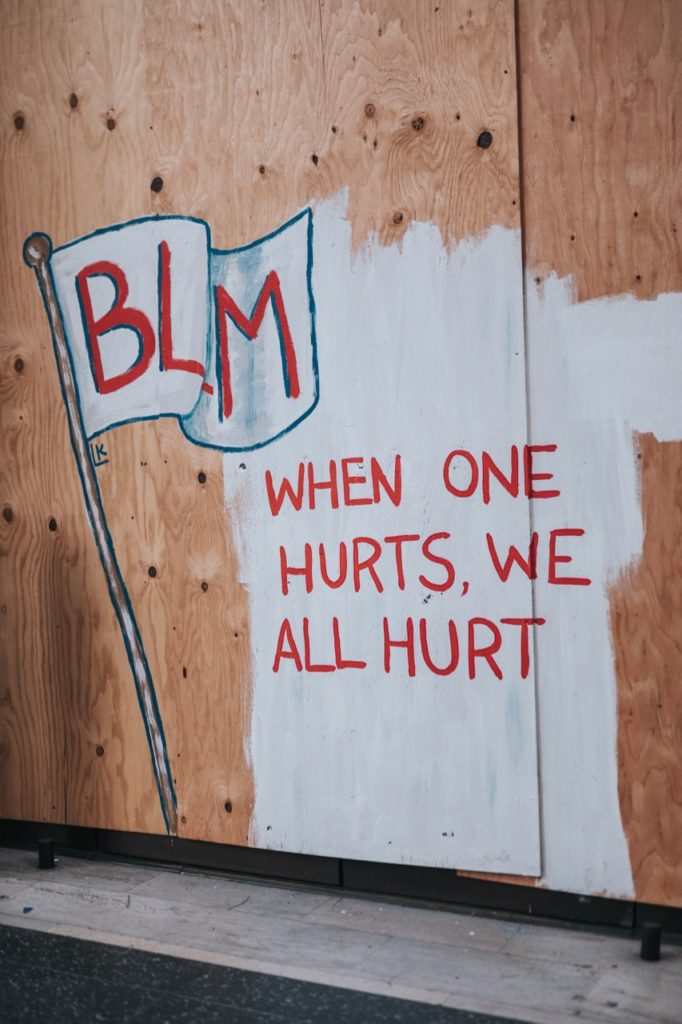Pat Neuwelt and Agnes Hermans
This time that we are living through, impacted by Covid19, Black Lives Matter, climate change etc., is a liminal space (from Latin limen=threshold). We are between ‘the old world’ and whatever the new world will be. Our assumptions of white privilege and the sense of entitlement it brings — to wellness, international travel, earned wealth, even to peace and democracy – have been proven to be illusions. It is a true time of unknowing, and a time when we are more teachable than most other times, because we’re vulnerable. It is a time of transformation.
In the midst of this liminal space, racism as a social system has emerged on the global stage. Awareness has been triggered by the brutal murder of the American George Floyd seen around the world… This system of privilege and power based on skin colour has remained largely invisible to those of us who benefit from it – those of us who are white. Black, Indigenous, and People of Colour (BIPOC) have been the losers in this system, which has its basis in colonial exploration and the formation of European colonies around the globe. BIPOC are aware of racism on a daily basis. In Aotearoa New Zealand, we have our own George Floyd stories. Like in the US, we have parents who worry daily whether their teenage son (Māori / Pasifika and others) will return home safely at the end of each day due to the colour of their skin. Our health, employment, child poverty and prison statistics all highlight the inequities that exist in our country.

What is the invitation to us, as seekers on the contemplative path, and as seekers who are white? The invitation is to do the mahi / work of understanding race and white privilege, so that we recognise – as Robin DiAngelo says in White Fragility – that each of us is racist by nature of having been born into social structures in which racism is deeply embedded. This is challenging shadow work. It requires humility – and an openness to learn about ourselves and how we (usually unconsciously) perpetuate racism. By doing our interior work, and then living out of a greater awareness, we can work to become ‘anti-racist’ and potentially become active allies to Maori, Pasifika and other People of Colour in Aotearoa New Zealand.
There are many resources available to do this work and we offer some suggestions below to get you started. Included are contemplative teachers who describe contemplative activism and provide examples of people who have integrated contemplation and action.
Can we hold spaciousness and gentleness for one another to enter more deeply into this work, drawing on the foundation of Love-in-abundance that is the Divine in whom we are all One? It is sacred contemplative work.
Resources on Contemplation and Racism:
Daily meditations over recent months from both Matthew Fox and the Centre for Action and Contemplation, have focused on contemplation and racism. See the archives on their websites for dailymeditationswithmatthewfox.org/ and cac.org/category/daily-meditations/
A Joy Unspeakable – Barbara Holmes (a book written about contemplation in the African American church, it expands one’s understanding of contemplative practice)
USA:
Brene Brown’s Racism Resource List: https://brenebrown.com/antiracism-resources/
University of Massachusetts Resource List:
Aotearoa New Zealand:
Human Rights Commission: Voice Of Racism www.voiceofracism.org
Courageous Conversations about Race – video (1:27m) Action Station https://www.facebook.com/ActionStationNZ/videos/284395659475704
Time to dismantle our Rotting House – article
Te Tiriti Based Futures and Anti-Racism 2020:
(Click on Youtube symbol upper right corner to subscribe to conference talks.)
Books:
White Fragility: Why it’s so hard for white people to talk about racism (2018) by Robin DiAngelo
Me and White Supremacy: How to recognise your privilege, combat racism and change the world (2020) by Layla Saad
How to be an Anti-Racist (2019) by Ibram X Kendi
